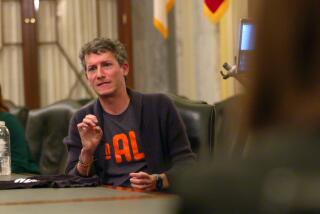Alone . . . With AIDS : A Family’s Heartache--and Hope
- Share via
BURLINGTON, Vt. — It took Jennifer Kenney Folsom a year to tell people she was suffering from AIDS. Her admission, her husband’s subsequent suicide, her death and their baby daughter’s death also from AIDS ultimately made Folsom a kind of legend in her home state.
But the agonizing months of denial before she went public compounded the sense of alienation Folsom felt in tiny (population: 846) Fayston.
Folsom was 27 when her AIDS was diagnosed. She had been listless and ill, with recurring bouts of diarrhea and what she later learned were telltale white sores in her mouth. Doctors in her area did not even think to test her for AIDS, not at first, because she was heterosexual and married, with no history of drug abuse.
Folsom told people in her community that she was suffering from leukemia. Folsom’s mother, June Kenney, said the story was concocted at the behest of Folsom’s auto mechanic husband, Doug Folsom, who feared public opprobrium and a possible cutoff of his insurance policy.
Said Kenney: “He was afraid people wouldn’t come down to have their cars fixed because his wife had AIDS.”
Kenney remembers her own amazement when she learned her daughter had AIDS. Folsom was healthy looking and beautiful. She took pride in her work as a hairdresser, and she had recently given birth to her second child.
“I thought: ‘No way, they got it wrong,’ ” said Kenney, who readily owned up to the kind of ignorance she believes still prevails in many areas--rural and urban alike. “I thought only people that use drugs or are gay have AIDS. Not my kid.”
Just after the Folsoms’ baby daughter, Angela, celebrated her first birthday in May, 1988, she, too, was found to have AIDS. The family put out the story that Angie had leukemia as well.
The secrecy and the mendacity took their toll on the family. After four years of sobriety, Doug, a recovering alcoholic, began drinking heavily, his mother-in-law said. Jennifer complained that living a lie was cutting short her already compromised life.
Then, about a year after she learned she had AIDS, Jennifer Folsom attended a motivational health seminar. The first order of business was for each person at the seminar to take the microphone. A once-vivacious blond stood up. In clear, honest tones, she announced, “I’m Jennifer Folsom and I have AIDS.”
Folsom told her mother she had never felt better. But as Folsom began to inform a small circle of friends about the true nature of her illness, Doug “went into his shell,” Kenney said. On a bright day in June, 1990, Doug Folsom left a tape-recorded message for Jennifer, telling her to “hang tough.” Then he climbed into a hammock outside the family’s home and shot himself.
“He had danced as long as he could,” Jennifer Folsom wrote in a letter to the local newspaper that ran with her husband’s obituary.
Folsom vowed she would live long enough to see her older daughter, Nicolette, board the bus for her first day of school that fall. She died in September, only a few days after reaching that goal. She was 29 years old. Angie, by then 3 years old, died six weeks later. Nicolette, who continues to test negative for HIV, now lives with one of Folsom’s brothers in Vermont.
In the last three months of her life, Jennifer Folsom blossomed into a public campaigner for awareness about AIDS. On her deathbed, she pulled June Kenney close and extracted a promise that her mother would continue her crusade.
“I could have just stuck all this on the back burner and got on with my life,” Kenney, 58, said. “But Jennifer had made this commitment to go public.”
Kenney’s efforts earned her the title of Mother of the Year in Vermont for 1990. But she brushes off commendations for her courage by instead lauding her daughter: “I think she woke up an awful lot of people, even the old dyed-in-the-wool strait-laced Vermonters.”
One thing Folsom helped people in rural Vermont to realize, her mother said, is that AIDS is a disease, not a moral stigma. The family told people Folsom contracted the disease because of a tainted blood transfusion after an appendectomy in 1979. But how it happened really doesn’t matter, her mother contends.
“Years ago I would have judged. I did judge,” Kenney said in an interview soon after her daughter’s death. “No more. How someone got AIDS doesn’t matter. It matters that they have the disease and that we deal with them with love.”


